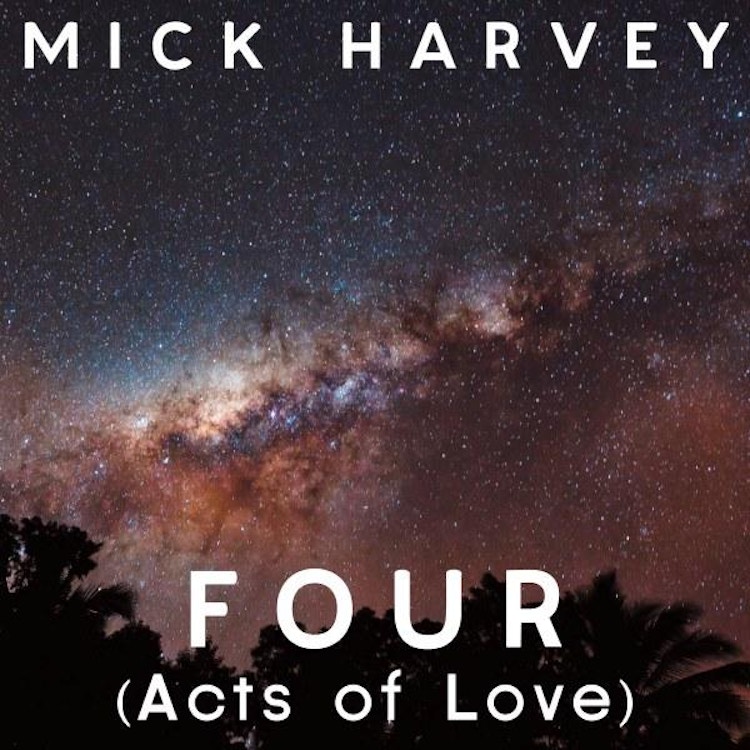"Four (Acts Of Love)"

Love has been inspiring and confounding artists for time eternal. And that elusive search for intimacy and meaning has certainly permeated Mick Harvey’s fruitful 36-year musical partnership with Nick Cave, as the duo penned numerous indelible numbers together that delved deep into the dark affairs of the heart, as well as the complications that arise from giving or taking away a vulnerable part of yourself from someone you hold dear. Harvey left behind Cave’s Bad Seeds in 2009, but the talented Australian multi-instrumentalist has still boldly continued to explore the raw passion that pulses at the creative heart of any and all meaningful music.
Mick hasn’t slowed down a bit in recent years – playing, producing, writing and recording an impressive array of stirring songs (most notably with longtime collaborator, PJ Harvey) that still resonate with the clarity of vision that infused his earlier work, even while his sound has grown more refined and muted as of late. Harvey’s sixth studio album, Four (Acts Of Love), features a restrained song cycle filled with wistful originals, suggestive covers, as well as a stirring collaboration with Polly Jean on one of her older, unreleased songs.
All the numbers artfully fit the affectionate theme of the title, with the record itself divided into three acts, all named for covers featured in each respective section: ‘Summertime in New York,’ ‘The Story of Love,’ and ‘Wild Hearts (Run Out Of Time).’ And while the mood of each act reflects the collective spirit of the specific song that inspired it, the all-too-brief album is filled with cursory, seemingly unfinished musical sketches – as if there is more to the ongoing, enduring conversation about love that Harvey is merely starting, leaving the listener left to finish themselves.
Whenever Harvey invests more time with the songs, the emotions of the numbers swell and the tracks take on an added weight and significance. But a frustrating majority of the songs are fleeting, two minute excursions that are over before the poignancy of the track can fully sink in, ultimately serving as mere introductions to the grander, more expansive musical statements found on the remainder of the album. The hymn-like exaltation of opener ‘Praise The Earth (Wheels Of Amber And Gold)’ is revisited at the end of the record on ‘Praise The Earth (An Ephemeral Play),’ which reinforces the theme of impermanence that courses through these songs, as well as the transient, elusive power that love holds over us for brief spells before disappearing.
‘Glorious’ is an unreleased PJ Harvey original culled from some old tapes Mick discovered, and Polly’s ominous, Stories From The Sea-era guitar riff blends fluidly with their restrained vocals as the song gradually begins to soar. But even in flight the track remains rooted to these dark times, exuding a mournful quality that is only enhanced by the funereal instrumental that follows it, ‘Midnight On The Ramparts,’ featuring ghostly whistles that are redolent and rich. A Tom Waits-like take on Exuma’s ‘Summertime In New York’ spiritedly picks up the pace of the record while also capturing the untamed heat of the warmer months in NYC.
‘When There’s Smoke (before)’ comes across as a hasty spoken word piece that announces the end of the first act as well as forming a lyrical bridge to ‘God Made The Hammer,’ which contains echoes of The Final Cut-period Pink Floyd, but the track never quite reaches the significance it is striving for. The gorgeous and moving ‘I Wish That I Were Stone’ fares much better, but again the track is so short (a mere minute-and-a-half) that the sentiments of the song never have a chance to fully settle and solidify, and the fragile emotions expressed remain only partially examined.
A truly haunting, moody version of Van Morrison’s ‘The Way Young Lovers Do’ is laden with regret and longing, and forms the stirring centerpiece of the record. But it seems that Harvey could have dug even deeper into the heart of the familiar number, as his vocals just trail off as the song comes to an abrupt, plaintive end, leaving the rueful lyrical dialogue somewhat unfinished and the ending of the inconstant relationship fairly uncertain.
‘A Drop, An Ocean’ is an inconsequential, slight diversion, before the second act comes to a glorious end with an impassioned take on the Saints ‘The Story Of Love,’ which maintains the classic appeal of the original while undergoing Harvey’s assured reworking. He brings a fresh spirit to the track, aided by the full band arrangement that stands out boldly from the more understated approaches found throughout the rest of the record.
‘Where There’s Smoke (after)’ ushers in the final act with another minor detour, quickly leading as it does to Harvey’s stunning, dramatic take on Roy Orbison’s pensive pop gem, ‘Wild Hearts (Run Out Of Time),’ which Mick renames optimistically as ‘Wild Hearts,’ suggesting that there is always more time for us to find a kindred soul in these uncertain times. ‘Fairy Dust’ is another lovely little number in the vein of ‘I Wish That I Were Stone,’ a stirring song that would be better served by being explored a bit more and given more time to express the insightful concepts that Harvey has only a moment to touch on. But there is more than enough genuine, heartfelt emotion and originality coursing through Four (Acts Of Love), with Mick Harvey proving himself yet again to have a tender touch when it comes to the delicate business of affairs of the heart.
Get the Best Fit take on the week in music direct to your inbox every Friday

Michael Kiwanuka
Small Changes

Sofie Royer
Young-Girl Forever

Lara Sarkissian
Remnants





